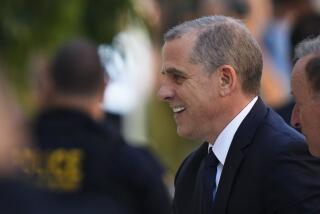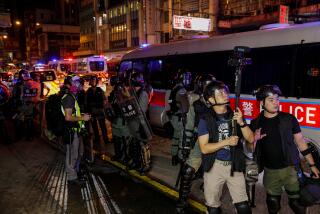U.S. Student Accused of Plot to Kill Bush Pleads Not Guilty
- Share via
ALEXANDRIA, Va. — An American student accused of plotting with Al Qaeda to assassinate President Bush pleaded not guilty to terrorism-related charges Monday, as defense lawyers signaled that they planned to put the administration’s war on terrorism on trial.
Federal prosecutors described Ahmed Omar Abu Ali, 23, a onetime valedictorian at an Islamic high school here, as a murderous Al Qaeda supporter who lived in Saudi Arabia with known terrorists. A federal judge ordered him held without bond.
Lawyers for Abu Ali, who was born in Houston and raised in Falls Church, Va., say evidence against him -- apparently a confession -- was coerced through whippings that left his back lined with 5-inch-long scars. He was held for 20 months in Saudi Arabia before being returned to the United States last month.
The defense plans to challenge his arrest by Saudi authorities and the “rendition” system, under which the CIA allegedly transfers detainees to nations that use interrogation tactics said to be more coercive than the methods used at U.S. military prisons.
“This trial is going to be about torture, rendition and extraordinary measures that were instituted after Sept. 11,” said Shaker El Sayed, a founder of the Muslim World Institute in Washington, who said he was speaking as a family friend.
In diplomatic but confrontational exchanges with U.S. District Judge Gerald Bruce Lee, defense lawyer Ashraf Nubani said he planned to file a motion seeking immediate access to medical and psychological experts to show that his client was tortured. Nubani also asked for a jury trial.
U.S. Atty. Paul J. McNulty told Lee that the government believed Abu Ali’s allegation “lacks any merit.”
Abu Ali’s story has been told largely through his lawyers because he is being held under “special administrative measures” -- allowed in some drug and terrorism cases -- that have barred him from seeing his family and, Sayed said, require his conversations to be in English and monitored by an FBI agent.
Prosecutors sought to postpone the trial until October, arguing that getting papers translated, finding foreign witnesses and clearing lawyers to view classified documents would pose time-consuming delays. Nubani urged a May 4 trial, contending that the government sought extra time to “concoct a case.”
Lee set a trial date of Aug. 22.
According to U.S. officials, Abu Ali, who was studying at the University of Medina, was arrested June 9, 2003, during a crackdown by Saudi authorities on alleged terrorist cells blamed for bombings that killed 34, including nine Americans, in three residential compounds in Riyadh a month earlier.
FBI Special Agent Barry Cole testified two weeks ago that Abu Ali had acknowledged in interrogations that he received weapons training after joining Al Qaeda in Saudi Arabia.
Abu Ali is charged with providing material support and resources to Al Qaeda; providing material support to terrorists; contributing services to Al Qaeda; receiving funds and services from Al Qaeda; and two counts of conspiracy.
If convicted, he faces as much as 80 years in prison.
More to Read
Sign up for Essential California
The most important California stories and recommendations in your inbox every morning.
You may occasionally receive promotional content from the Los Angeles Times.













